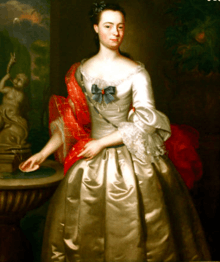Jonathan Belcher (jurist)
| Jonathan Belcher | |
|---|---|
|
Portrait by John Singleton Copley | |
| Governor of Nova Scotia | |
|
In office 1760–1763 | |
| Monarch | George III |
| Preceded by | Charles Lawrence |
| Succeeded by | Montague Wilmot |
| Chief Justice of the Nova Scotia Supreme Court | |
|
In office 1754–1776 | |
| Succeeded by | Charles Morris |
| Personal details | |
| Born |
July 23, 1710 Boston, Massachusetts |
| Died |
March 30, 1776 (aged 65) Halifax, Nova Scotia |
| Relations | Jonathan Belcher, father |
| Religion | Church of England |
Jonathan Belcher (July 23, 1710 – March 30, 1776) was a British-American lawyer, chief justice, and Lieutenant Governor of Nova Scotia.
Born in Boston, Massachusetts, the second son of Jonathan Belcher and Mary Partridge, Belcher entered Harvard College, where in 1728 he received a Bachelor of Arts degree. In 1731 he proceeded to Master of Arts, also at Harvard. In 1730, he entered the Middle Temple, London, to read law, and in 1734 was called to the English bar. In the mean time he had been admitted as a fellow-commoner to Trinity College, Cambridge, where in 1733 he received another Master's degree in mathematics.[1] He later received a third Master's degree from the College of New Jersey (now Princeton University).
In 1754, Belcher was sent to Nova Scotia to become the first Chief Justice of the Nova Scotia Supreme Court. Prior to Belcher’s arrival Nova Scotia had no formally trained law officers.[2] He also served on the Nova Scotia Council. On July 28, 1755, he published a document which concluded that deportation of the Acadians was both authorized and required under the law.[3] From 1761 to 1763, he was also Lieutenant Governor of Nova Scotia. He negotiated the peace that led to the Burying the Hatchet ceremony in Nova Scotia.
He died in office in 1776. He is buried in Old Burying Ground (Halifax, Nova Scotia).
Legacy

Belcher gave his name to Fort Belcher (1761–67), after which Fort Belcher Road, Lower Onslow, Nova Scotia is named. The fort was built at the same time as Fort Ellis (Nova Scotia).
Belcher married in King's Chapel, Boston on 8 April 1756 to Abigail Allen. A salver (silver platter) given to them on their wedding day is now in the Metropolitan Museum of Art.[4] They had five sons and two daughters.
Notes

- ↑ "Belcher, Jonathan (BLCR732J)". A Cambridge Alumni Database. University of Cambridge.
- ↑ Buggey 1979
- ↑ Bakan, Joel (2010). Canadian constitutional law. Toronto: Emond Montgomery Publications. p. 70. ISBN 978-1-55239-332-1.
- ↑ Early American Silver in The Metropolitan Museum of Art By Wees, Beth Carver, Harvey, Medill Higgins, p. 112
References
- Nova Scotia Historical Society. 1914, p. 25
- Buggey, S: - "Jonathan Belcher". Dictionary of Canadian Biography (online ed.). University of Toronto Press. 1979–2016.
